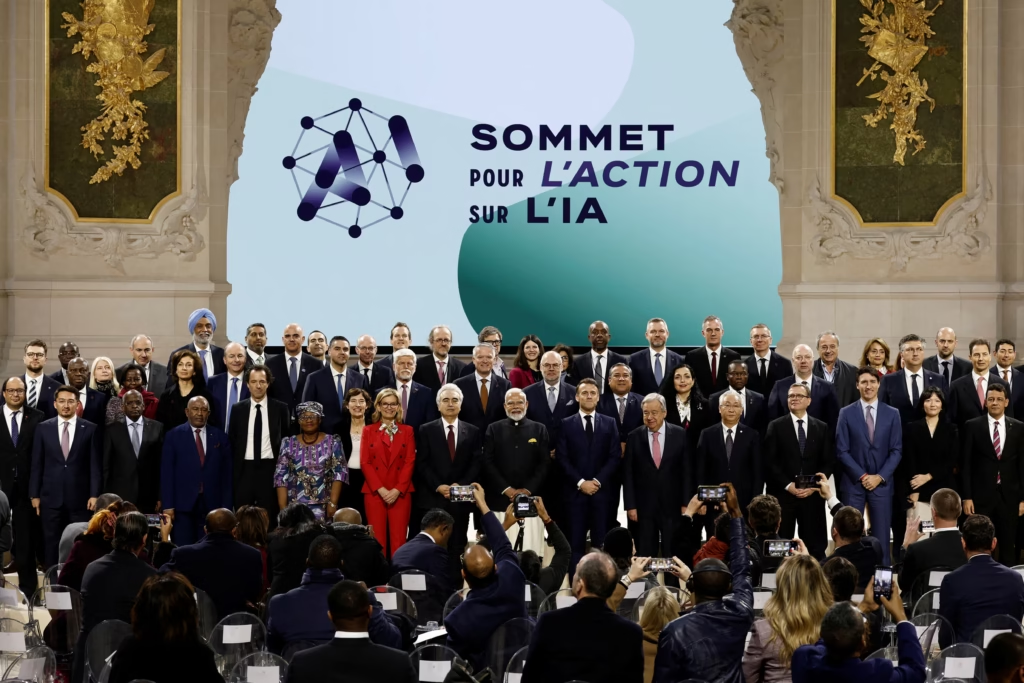In a notable development at the Paris AI Summit, both the United States and the United Kingdom have refrained from signing the declaration that was expected to set the global framework for the responsible development and regulation of artificial intelligence (AI). The summit, which brought together leaders from governments, technology companies, and international organizations, was a significant attempt to establish global norms and guidelines for AI’s ethical use and to ensure its benefits are widely distributed.
The Paris AI Summit Declaration: A Global Push for AI Regulation
The Paris AI Summit aimed to forge a consensus on a set of principles that would guide the development of artificial intelligence technologies while addressing concerns related to safety, fairness, and transparency. The declaration was designed to promote international collaboration and provide a roadmap for regulating AI in ways that mitigate risks such as bias, misinformation, and the potential loss of jobs due to automation.
The declaration includes commitments to ensuring AI systems are developed with fairness and accountability, safeguarding privacy rights, and promoting transparency in AI-driven decision-making processes. It also stresses the importance of maintaining human oversight over critical applications of AI, particularly in areas such as healthcare, security, and justice.

The absence of signatures from the US and the UK, two of the world’s leading nations in AI development, has raised questions about the future of global AI governance and the potential implications for international collaboration on these pressing issues.

Reasons Behind the Non-Signature
While the specific reasons for the US and UK’s refusal to sign the declaration were not fully disclosed at the summit, there are several factors that could explain their hesitance.

For the United States, there has been a longstanding preference for a more flexible, market-driven approach to AI regulation, with an emphasis on innovation and competitiveness. The US government has often expressed concerns that overly stringent regulations could stifle technological progress and hinder the development of cutting-edge AI technologies. The country’s tech giants, including Google, Microsoft, and OpenAI, are at the forefront of AI research and development, and the government may feel that international agreements could potentially limit their ability to lead in the space.
Additionally, the US has been pursuing its own AI initiatives and frameworks, which are more focused on ensuring national security and economic competitiveness. The lack of a clear and unified stance on AI regulation at the federal level could be another reason why the US did not sign the Paris declaration, as it could prefer to maintain control over its own approach to AI governance.
Similarly, the UK’s decision not to sign the declaration may stem from concerns over the potential impact on its growing AI industry. While the UK has made significant strides in AI research, it too has emphasized a regulatory approach that balances innovation with risk mitigation. The country’s desire for regulatory autonomy and the need to ensure that AI policies align with its broader tech ecosystem could be factors in its decision to withhold its signature.
Global Reactions to the Non-Signatures
The US and UK’s refusal to sign the Paris AI Summit declaration has sparked a variety of reactions from other countries and stakeholders in the AI community. Many nations, particularly those in the European Union, have expressed disappointment at the absence of these two powerful AI players from the declaration. For countries that have prioritized AI regulation and ethical considerations, the US and UK’s hesitance may be seen as a setback in efforts to create a cohesive international framework for AI governance.
On the other hand, some experts and policymakers argue that the decision of the US and UK to withhold their signatures could be a pragmatic one, reflecting the complexities and diverse approaches to AI regulation around the world. The differing priorities of these nations, such as economic growth, national security, and technological leadership, could suggest that a one-size-fits-all global agreement may not be feasible.
The Road Ahead for AI Governance
Despite the absence of the US and UK, the Paris AI Summit declaration represents a significant step forward in the global conversation on artificial intelligence. It highlights the need for international collaboration on the ethical and responsible development of AI, even if not all countries are ready to sign on to a binding framework.
The absence of these two major players does not mean that progress on AI regulation will halt. Other countries, including members of the European Union, are likely to continue pushing for stronger regulatory frameworks, and there may be opportunities for the US and UK to engage in these discussions outside of the declaration. Furthermore, the global AI landscape is evolving rapidly, and as technology advances, there may be increasing pressure on countries to come together and agree on standardized principles to guide AI development.
In the meantime, the US and UK may continue to pursue their own national AI strategies, which could lead to a fragmented regulatory environment in the short term. This could create challenges for international collaboration, but it also offers an opportunity for these countries to lead by example and develop frameworks that can be later integrated into broader global agreements.
Conclusion
The US and UK’s decision not to sign the Paris AI Summit declaration reflects their differing priorities and approaches to the regulation of artificial intelligence. While this development may raise concerns about the future of global AI governance, it also underscores the complexities involved in balancing innovation with regulation. As AI technologies continue to evolve, it remains to be seen how countries will navigate these challenges and whether a unified international approach to AI regulation will ultimately emerge. For now, the Paris declaration serves as an important milestone in the ongoing dialogue about the ethical and responsible use of AI, but it also highlights the need for continued discussions and cooperation between nations.
Do follow Uae stories for more Updates
Pakistan Deputy Prime Minister Invites UAE Firms to Invest in Telecom Sector












